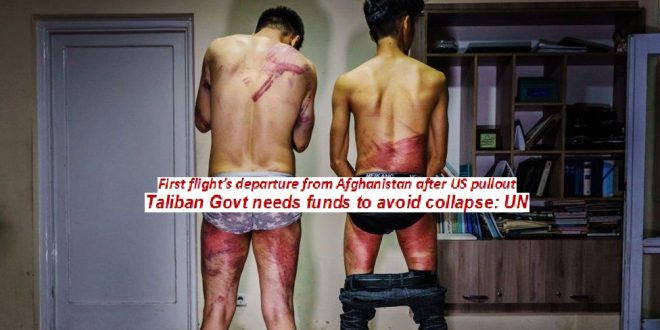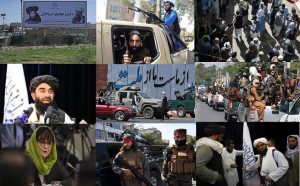10-09-2021
By SJA Jafri + Bureau Report + Agencies
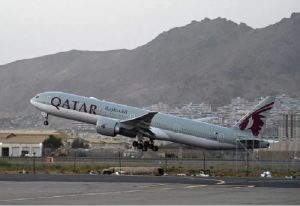 KABUL/ ISLAMABAD/ WASHINGTON: Journalists in Afghanistan say that they have been beaten, detained and flogged by the Taliban when attempting to cover protests.
KABUL/ ISLAMABAD/ WASHINGTON: Journalists in Afghanistan say that they have been beaten, detained and flogged by the Taliban when attempting to cover protests.
Photos circulating online, show two journalists from Etilaatroz newspaper with welts and bruises after their arrest in the capital Kabul.
One of them, Taqi Daryabi, told media he had been taken to a district police station where he was kicked and beaten.
On Wednesday, the BBC’s team was also prevented from filming.
Daryabi, alongside Etilaatroz’s photographer Nematullah Naqdi, had been covering a women’s protest in Kabul on Wednesday.
Afterwards, they were taken to a police station, where they say they were beaten with batons, electrical cables and whips. A few hours later, they were released by the Taliban, without explanation.
“They took me to another room and handcuffed my hands behind me,” he told the BBC’s Secunder Kermani in Kabul. “I decided not to defend myself because I thought they would just beat me even worse, so I lay down on floor in a position to protect the front of my body.
“Eight of them came and they started beating me… Using sticks, police sticks, and rubber whatever they had in their hands. The scar on my face is from shoes where they kicked me in face.
 “I was unconscious after that so they stopped. They took me to another building where there were cells and left me.”
“I was unconscious after that so they stopped. They took me to another building where there were cells and left me.”
Daryabi said he had fallen unconscious after the beating, and that after about two hours he had been released.
“I could barely walk but they were telling us to walk quickly. I was in very bad pain.”
Nematullah Naqdi said Taliban fighters had tried to take away his camera as soon as he started taking photographs of the protest.
“One of the Taliban put his foot on my head, crushed my face against the concrete. They kicked me in the head… I thought they were going to kill me,” Naqdi told AFP news agency.
He asked why he was being beaten, only to be told: “You are lucky you weren’t beheaded.”
Afghanistan’s Tolo news agency reported that its cameraman had been arrested and held by the Taliban for nearly three hours.
The CPJ, an international non-governmental organization, said at least 14 journalists had been detained and then released over the past two days.
“The Taliban is quickly proving that earlier promises to allow Afghanistan’s independent media to continue operating freely and safely are worthless,” said Steven Butler CPJ’s Asia program coordinator.
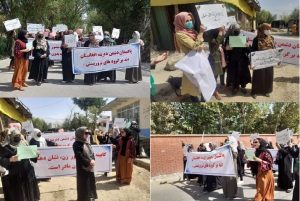 “We urge the Taliban to live up to those earlier promises, to stop beating and detaining reporters doing their job, and allow the media to work freely without fear of reprisal.”
“We urge the Taliban to live up to those earlier promises, to stop beating and detaining reporters doing their job, and allow the media to work freely without fear of reprisal.”
Earlier this week, the Taliban, which seized control of Afghanistan in a sweeping offensive more than three weeks ago, announced the formation of an all-male interim government to rule the country.
Since then, they have effectively banned protests, declaring them illegal unless permission is sought from the ministry of justice.
Meanwhile, a UN envoy on Thursday urged the world to keep money flowing into Afghanistan despite concerns over the Taliban government, warning the already poor country could otherwise suffer a historic breakdown.
Deborah Lyons, the secretary-general’s special representative on Afghanistan, called on the world at least to give a chance to the victorious Taliban as they turn to governance and confront a severe economic decline.
“A modus vivendi must be found and quickly that allows money to flow to Afghanistan to prevent a total breakdown of the economy and social order,” Lyons told a Security Council meeting.
If not, the result would be “a severe economic downturn that could throw many more millions into poverty and hunger may generate a massive wave of refugees from Afghanistan and indeed set Afghanistan back for generations.”
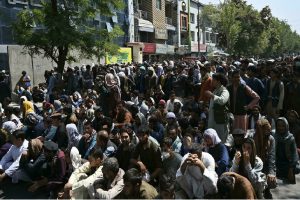 She warned that the new Afghan authorities cannot pay salaries and voiced alarm over a storm of crises including a plunging currency, sharply rising food and fuel prices, and a lack of cash at private banks.
She warned that the new Afghan authorities cannot pay salaries and voiced alarm over a storm of crises including a plunging currency, sharply rising food and fuel prices, and a lack of cash at private banks.
Foreign donors led by the United States provided more than 75 percent of the public expenditure under Afghanistan’s 20-year Western-backed government and quickly stopped payments as it crumbled last month amid a US military withdrawal.
President Joe Biden’s administration has voiced openness on humanitarian aid but says that any direct economic lifeline, including unfreezing some $9.5 billion in Afghan central bank assets, will be contingent on Taliban actions including allowing safe passage to people to leave.
Lyons, a former Canadian ambassador to Afghanistan, agreed that “safeguards must be created to ensure that this money is spent where it needs to be spent and not misused by the de facto authorities.”
Earlier, just over 100 passengers, including some Americans left Kabul airport on Thursday on the first flight carrying foreigners out of the Afghan capital since a US-led evacuation ended on August 30.
The first international flight came as the Taliban continue their transition from insurgents to governing power, less than a month after they marched into Kabul and ousted President Ashraf Ghani.
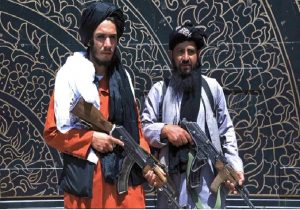 More than 100 passengers were on the Qatar Airways flight that landed in Doha on Thursday evening, 10 days after a mammoth, chaotic airlift of more than 120,000 people came to a dramatic close with the US pullout.
More than 100 passengers were on the Qatar Airways flight that landed in Doha on Thursday evening, 10 days after a mammoth, chaotic airlift of more than 120,000 people came to a dramatic close with the US pullout.
An Afghan-American dual citizen, waiting to board the flight with his family, said the US State Department had called him in the morning and told him to go to the airport.
“We got in contact with the State Department, they gave me a call this morning and said to go to the airport,” the father, who asked not to be named, told AFP.
In the days that followed the Taliban’s blitz, the airport had become a tragic symbol of desperation among Afghans terrified of the militants’ return to power — with thousands of people crowding around its gates daily, and some even clinging to jets as they took off.
More than 100 people were killed, including 13 US troops, in a suicide attack on August 26 near the airport that was claimed by the Islamic State group’s local chapter.
Away from the airport, there was a noticeably stronger Taliban presence on the streets of Kabul as armed fighters — including Special Forces in military fatigues — stood guard on street corners and manned checkpoints, according to AFP journalists.
Qatar has acted as the central intermediary between the Taliban and the international community in recent years, and numerous countries, including the United States, have relocated their embassies from Kabul to Doha in the aftermath of the Taliban takeover.
Doha has said it worked with Turkey to swiftly resume operations at Kabul’s airport to allow the flow of people and aid.
An airport official in Kabul said just over 100 people boarded the flight. A source with knowledge of the operation in Doha said 113 were on board. Sources had earlier said that as many as 200 people were aboard.
The White House spoke in positive terms about how the Taliban handled the charter flight that included Americans.
“They have shown flexibility, and they have been businesslike and professional in our dealings with them in this effort,” National Security Council spokesperson Emily Horne added, stressing that efforts to facilitate such evacuations of Americans and Afghans who worked with the US mission would continue.
White House press secretary Jen Psaki declined to say at a press conference how many Americans were on the flight, saying the plane had only just landed and the US did not yet have all the details.
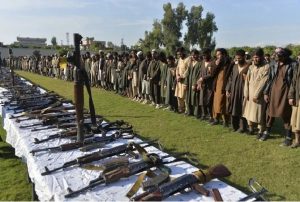 Earlier in the day Psaki said there were around 100 Americans still in Afghanistan and wishing to leave.
Earlier in the day Psaki said there were around 100 Americans still in Afghanistan and wishing to leave.
The United States “facilitated” Thursday’s departure of Americans and it thanked Qatar for its role, Horne said.
Canada’s Foreign Ministry said 43 citizens of that country were on the plane and that they will be repatriated in the next few days.
Dutch Foreign Minister Sigrid Kaag tweeted to thank the Qatari government “for making this possible” and said 13 Dutch nationals were on board the flight.
Protest ban
Most of the early Afghan evacuees were desperate to flee fearing Taliban reprisals for having worked with foreign powers during the 20-year, US-led occupation.
The Taliban have said they will not prevent anyone who wishes to from leaving the country, even as they have urged skilled Afghans, such as doctors and engineers, to remain.
The Islamist hardliners have pledged a more moderate brand of rule than in their notoriously oppressive 1996-2001 reign.
However, they have shown clear signs that they will not tolerate opposition.
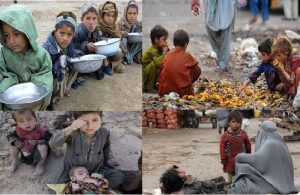 Earlier this week armed Taliban militants dispersed hundreds of protesters in cities across Afghanistan, including Kabul, Faizabad in the northeast and in Herat in the west, where two people were shot dead.
Earlier this week armed Taliban militants dispersed hundreds of protesters in cities across Afghanistan, including Kabul, Faizabad in the northeast and in Herat in the west, where two people were shot dead.
Late Wednesday, they moved to snuff out any further civil unrest, saying protests would need prior authorisation from the justice ministry, adding that no demonstrations were allowed “for the time being”.
One protest organiser told AFP rallies in Kabul had been cancelled because of the overnight ban.
Promises of inclusion
A Taliban interim government, drawn exclusively from loyalist ranks, formally began work this week with established hardliners in all key posts and no women despite previous promises of an inclusive administration for all Afghans.
All the top positions have been handed to key leaders from the movement and in particular the Haqqani network, the most violent Taliban faction, known for devastating attacks.
The dreaded Ministry for the Promotion of Virtue and Prevention of Vice, previously responsible for arresting and punishing people for failing to follow the movement’s restrictive interpretation of sharia is being reinstated.
 Pressmediaofindia
Pressmediaofindia
